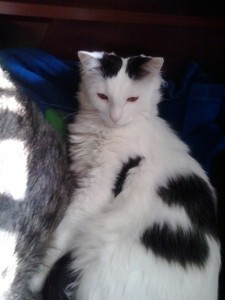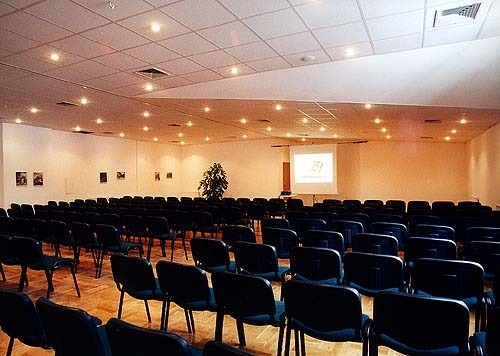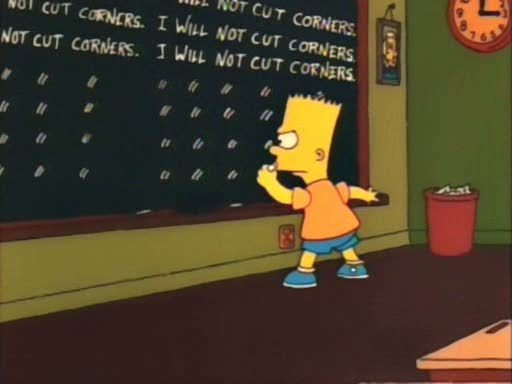Kate Larking's Blog: Anxiety Ink, page 78
October 23, 2013
The Essentials of Writing Conferences – Post 2
In this series, I am going to write about the essentials of writing conferences. These are some of the most important things that I have noticed in my conference career (now entering my fifth year of 2 conferences minimum per annum).
If you are a writer and you are at the conference with a book to sell or want to network and learn, keep reading.
Part 3 of too many: Network with a recognizable feature.
My recognizable feature in World Fantasy 2009? A goat.
I went through the autograph session and went up to people to sign my little album of signatures (I can’t tote too many books from my library across the border). After they sign and I make small talk, I ask them to pose with my stuffed goat, Yokimo, either appropriately…or inappropriately.
And you can tell a lot about an author by their pose. People not quite willing to make a fool of themselves but consider themselves witty pose with the goat on their shoulder. People who are cute and wholesome clutch the goat in front of them and smile sweetly. People who enjoy having a flirtatious persona pose to kiss the goat. People who are not self-conscious post…rather radically. Either biting the goat butt (Kat Richardson), smashed-faced (Jay Lake), and plunging the goat down the neckline of their corset top (I’m looking at you, Laura Anne Gilman).
Recognizable features are ones that are universal to all authors you interact with and are great conversation starters for later. My reason for the goat? I’m gathering blackmail material to further my publishing career. It has also allowed me to be recognized in subsequent years when I tell that person their touched my goat inappropriately.

Source: Lyncombe Lodge
Part 4 of too many: They are all at the bar.
Conferences generally have totally awesome panels, readings, events, artwork galleries, and vendor rooms. That of course, allows you to get to hear all the things you want and fill up your schedule. But if you have time where you aren’t particularly attached to the events happening, there is a very important place to be. There all the authors, publishers, agents gather and schmooze.
Everyone is at the bar. Everyone. Go to the bar. If you’re lucky, there will be a well laid out bar where a lot of people are readily accessible. If you’re even more lucky, management of the bar will have listened to convention organizers and triple- to quadruple-stocked the bar. There have been conventions where alcohol has been depleted by the first evening (and I hear these are treacherous. Attendees evacuate the hotel and disperse among many bars in the area where it will become much more difficult to network, especially if you are not wearing your nametag everywhere in a strange city).
At the bar, people have scheduled one-on-one meetings. Do not interrupt.
At the bar, groups and organizations meet. Tentatively interrupt, but only if you have a segue into the conversation or group.
At the bar, people work on things. Don’t interrupt unless you’re expected. Otherwise, prepare to be eviscerated in blog form.
The following is information about what to drink and the impression it leaves. This was garnered from a conversation with Kat Richardson at WFC 2009:
Whiskey or Scotch = +10 points. Very professional. Hardened with writerly experience with rejection.
Fruity drinks = -10 points. Flouncy, young, potentially unprofessional.
Cappuccinos = +10 points. As long as you don’t complicate the essence of the drink, this will do very well if you are not a drinker. Sophisticated enough that you don’t look pretentious.
Lattes = -5. Anyone can do what you do.
Water, Tea, or Coffee = 0 points. People will be wary of you as you are notably not drinking and will not be intoxicated later. You are a potential liability for your witnessing of drunken behaviour.
Adding anything to coffee or tea = -10 points. You are high maintenance, hard to please, and finicky.
October 21, 2013
Story Planning
Once upon a time, I was a complete and total pantser. The feeling of beginning a story with nothing more than a thought and no idea where it will take me is intoxicating. But those stories had a tendency to meander and die.
So I started planning more. Getting to know the characters and what they want, the world and where the plot will go at least allowed me to reach the end. But I still felt my way, made more mistakes than I got right. Editing took forever, but at least I had enough to edit.
I write better and faster when I have a clearer idea of the story I’m telling. I still have a hard time figuring out what they’re about until long after reaching the end, so outlines do not come easily. And really, I don’t want to know each twist and turn the story is going to take before it gets there. The discovering is half the fun.
How to strike that happy medium?
My approach constantly changes. Someday it may settle, but not yet. Finding what works and what doesn’t is a lot of experimenting. It’s trial and error, find out out all you can of how other writers do it. Discard what doesn’t feel right.
Stories have beats. Like learning a dance, the trick is in finding the feel of those beats, internalizing it so that to your audience, the dance is perfectly in synch. Miss those beats, and the whole dance — the whole story — falls flat.
But story structure is a whole other post. This post is about outlining. Or lack of it. I do something in between. I figure out the major beats. They may change later, but that gives me a road map, a direction to keep the story moving.
Knowing that the beats are is one thing. Hitting them is quite another.
October 17, 2013
Getting Down To It, Because Everyone Says I Have To
The rules of writing go like this:
Get up off (get on?) your butt and write
Close facebook and write
Stop looking at or taking cute kitty pictures and write
Everyone says you need exposure on twitter but stop opening tweetdeck
Stop making excuses and write
Stop planning world domination and write
You get the picture. It’s so simple –just write!– so why is it so hard?
As you can see by my title I’m feeling rather petulant, it’s a “why do they make me write” versus a “yay I get to write” kind of time. I’m in low energy mode, basically a moody funk. My routine has shifted once again in the span of a month and a half, and it’s left me dazed and moving around like a zombie. As a creature of routine, even small shifts feel like a kick in the face because they all require adjustment. Too many changes means too many adjustments, and those are what take it out of me.
I haven’t been getting any writing done for over a –well, too long to admit–, and that’s making me feel like a failure. I want to write for a living, how can I support myself if I can’t even make myself get down to the basics of getting words on the page. Arg!
It’s an irritating cycle, I don’t write for a while and then I find it gets harder and harder to get back to it. Then I get anxious. Just before launching Anxiety Ink I was in full work mode, I was writing stories or blog posts nearly every day. Having just gotten really great feedback from my writing workshop with Patricia Briggs, being plied with information from WWC, and planning this site with Kate and M.J., I was in full excitement mode. Now?

Whaa??
I don’t know! I’m still writing blog posts because there are other people counting on me but I have this terrible trend of letting myself down. I’m my own worst enemy. This too makes me anxious. And that’s why Anxiety Ink really resonates with me. Sure, the name is catchy and lots of writers are anxious about deadlines and whatnot, but I’m an anxiety ridden person. Everything, I’m not even kidding you –everything– makes me anxious. It drives me crazy (and ups the anxiety) and confuses my friends and family (which further ups the anxiety). *insert curse word of choice here*. Blah.
I’m in a rut goshdarnit. I’ll admit that I have a near crippling fear of failure which makes me want to avoid the keyboard all the more, but that’s no excuse. You can’t fail if you don’t try, right? And if you don’t try that’s a failure in itself. I think this is an oxymoron moment.
And I think it’s an enough whining moment.
I forgot what I told Kate many weeks ago, that my motivation is the image of her chasing me with a white hot poker that spells out WRITE! I need to draw it and put it on my wall, because she’ll be too eager to act it out so I can get a photo. And I dislike burns. They’re ouchie. But it’s a good kick in the butt.
We go into a trend of setting goals with each other but I think I need to up the ante. It’s sad that I need the impetus from an outside source to write but if it’s what it takes right now I’ll work with it. Eventually, maybe, hopefully, that’ll change. Or I’ll have a larger audience willing to chase me with fire-hot metal. Never thought I’d dream of that…
So, Anxiety Ink is really important to me. And I really need it right now, as much as I need the support of the two wonderful women who helped build Anxiety Ink with me. They make me sit in front of the computer even on the days I look at it with loathing.
Now, if you’ve held in this long I’m mostly done talking about me, well, not entirely, but this part will actually be useful for others! Especially if you can’t connect with any of my ailments and you were rolling your eyes through my little pity party above. Aside from all that, I had an epiphany about why I haven’t been able to write a piece I’ve been mulling and really wanting to get down. One of my characters was violently resisting the back story I was trying to give her, and because she’s in two of the pieces I’m working on right now too, I’ve been unable to get anywhere with any of it. Ah ha!
I’m going to talk more about that in one of my next posts but it’s so nice to have a reason why I can’t even edit. So if you’ll excuse me, I have some backtracking to do.
October 16, 2013
The Essentials of Writing Conferences – Post 1
In this series, I am going to write about the essentials of writing conferences. These are some of the most important things that I have noticed in my conference career (now entering my fifth year of 2 conferences minimum per annum).
If you are a writer and you are at the conference with a book to sell or want to network and learn, keep reading.
Part 1 of too many: The business card
Business cards are amazing things. They have your name, contact information, book information, representation information, and can be infused with personality.
You don’t want to overclutter the card! Do not have EVERYTHING on the one card (or crammed onto one side with the other side blank). If you are a member of every social networking website EVAH, simplify and streamline your identities. People will figure things out.
Do not put any information on the card you don’t want EVERYONE to have. Everyone you exchange a card with has the potential to contact you in any method you put on there. If you don’t want people phoning you, don’t put your phone number on the card. Simple as that. Mine have my name and e-mail. I can prompt people with how to find me on social networks but the main thing is my email as a primary way to contact me and I can then direct how I want to further socialize–exclusively by email, add on facebook, etc.
Handmade cards are treasured, especially if the card has texture.
Do not print on paper that is too waxy. People want to write details on your card or you’ll want to write an extra memorable detail on your card before passing it on.
If you want someone’s contact information–say, an agent or another writer–give the your card and smile. Politeness tends to result in a reciprocated card.
When you have a card, don’t drop it into your bag heedlessly while talking. Tuck it into your wallet or the back of your name card so that the person knows that their investment in you is warranted and you plan on respecting that friendship.
When you get back to your room, write on the card where you met that person and what you talked about. This will be helpful when you plan to contact them after the conference to not only jog your memory, but theirs.

Source: Budget Conferences
Part 2 of too many: Nametag etiquette
Conferences give you nametags. At least, they will have your name on them already. Sometimes, they will include where you are from so people can profile and segregate you (or you can clump together with others for protection).
If you have an internet identity that is dissimilar from your real and/or pen name, bring a sharpie (or comparable substitute with you) to write your internet identity onto the card. This helps everyone draw lines to your internet self to your in person self. HOWEVER, if you are a snarky bitch/bastard online that no one likes and talks too much, skip this step and act more demure than you are to keep up the innocent façade to garner more dirt to write about.
Nametags are permanently, naturally uncooperative. They hang too long, flip around, slide down, slip in, loosen, catch on things…etcetera. When you are approaching someone to introduce yourself and you wish to be remembered, make sure your card is facing correctly outward. If you plan on mugging that person, turn the card inward so the name is not present. A printed name visible to authors who deal with words for a living are more easily remembered (verbally and written) and associated with your physical presence.
When you leave the conference hotel or building, for the love of all things holy, remove your name tag. Conference buildings, generally, don’t fall into the best parts of town because land needs to be cheap to have a building that big. Especially if you are a solo-tripping female, you will want to protect yourself. A nametag with your conference and name will only generate problems for your outside of the hotel grounds as people can easily track a conference back to the hotel hosting it and search for you there.
October 13, 2013
What’s In A Name?
Elisa’s post last week hit on a subject near and dear to me. So I’d like to continue the discussion on naming characters and places in our stories. No advice here — just my own experience. Please share yours in the comments!
I most often refer to my stories by the main character instead of title (partly because titles are the banes of my existence and about the last thing I figure out in my process, but that’s another post), so names are vitally important. I have spent hours getting a single name just right. Except that’s usually when getting it “just right” doesn’t quite happen.
Sometimes the right name pops into my head with hardly a thought. In recent years, my experience has been more and more often the latter, less the former.Or sometimes I’ll grab a placeholder name, only to find out that the name has stuck. The character grows to fit the name.
That last is a process I’m only aware of in retrospect, but it never ceases to fascinate me.
A few of my stories take place in worlds vaguely modeled after the formality and propriety I associate with, say, Victorian England. One way to conjure that association, as well as give readers some familiar touchstones, is to pick names typically common to older eras. Those are the times I haven’t needed to think so hard about naming characters.
My favorite naming challenge so far is a family of seven siblings, all in some serious supporting roles. Writing scenes is a logistical nightmare. It’s fantastic. And they are so much themselves. I couldn’t change a single one of their names. A rose by any other name may smell as sweet, but the experience of that rose completely changes.
As writers, one thing we know is that words have power. Names are words that contain a soul.
But don’t worry about getting it perfect! Have faith that it will work out. After all, there’s always revision.
October 12, 2013
Character Naming: Procrastinating At Its Finest
Where do your characters’ names come from? Do they spontaneously pop into your head first and you just know that that person is connected to a story? Does the story come first and the perfect names follow? Do you write that story with Jane/John Doe 1, 2, 3…? Or do you recycle names? Or, are you like me, and you spend hours picking character names because you need to find the perfect ones first and you cannot write without them? I’m always relieved when one pops into my head, but it happens so rarely.
I think character names are an important place to start in story writing, especially if you’re like me. Thinking about their significance to you is also important. As I’ve said before, you need to know your process, you need to understand how you work to be more effective. For me, character naming is part of my research, and it’s also part procrastination. It’s a pre-step to story time that I love “wasting” precious hours on. Yet, when you’re trying to write alongside school and/or work you really need all the time you can get. And you need to maximize it.
I’ve got a few shortcuts to character naming I’ve carved out over the past few years. I’ll share them because I think they’ll help you get closer to the nitty gritty of writing faster. Again, if you’re like me, you need the help.
I will admit here and now that I am an etymology nerd. I love names (words really) and learning about their meanings, cultural significance, and how they’ve changed over time. And the best part about this is that the internet has made learning this info so much simpler! You can just Google names from whatever cultural background your character has and a great list is generated for you.
My hands down favourite site is . Not only do they provide names and their meanings/histories, names are sorted alphabetically by culture and/or gender (with cross-references!). Baby name sites are also a handy resource when you’re being indecisive.
But, what if you want names specific to a region, you ask? Especially a region like North America that is made up of multiple ethnicities. My ultimate, #1 tip for such a request: cemetery records for the town (or area near your imaginary town) you’re writing about. If you look up a town/city’s website you should be able to locate such information through that. Or Google search the city’s cemetery records directly. Historical fiction writers should remember this.
All of this is applicable to surnames as well. Another thing I do is write names down while watching reality TV (which is again helpful with regions). Or, depending on what kind of day job you work, if you’re exposed to names a lot you can start generating a list that way.
I’m curious to hear how other people tackle naming their characters, so comment away! I hope for your sake you don’t approach it like you’re trying to decide what to call your first born, like I do.
October 9, 2013
One million dollars! Err, I mean, 1 million words!
There is an underlying belief that in order to be a successful writer, you need to have 1,000,000 words written before you will start to see success. This 1,000,000 or 10,000 hours “rule” has applied to a lot of things: hobbies like golf or hockey, business success, language learning, or playing musical instruments. There is the idea that if you do something enough times or long enough, you will remove the variability in the outcome and will be more reliable and successful.
It might be true for something like typing when it comes to words. The more you type, the faster and more concise you get, producing less typos or having a more immediate reaction to typos in order to fix them.

Source: http://bartsblackboard.com/i-will-not...
For creative writing? Not so much.
Seriously now, what happens if you write the same story over and over and over again? You might tighten up a few sentences here and there, or reform a plot point that you want changed…but how far will that really get you towards a solid story?
The key for development relies in consistent assessment of the work that you have done and considering the feedback of others. This could be editors or a critique group, or even a few beta readers. The consideration and incorporation of feedback is the key to growth and, ultimately, success.
Does this stop anyone from holding onto the 1,000,000 rule-of-thumb and saying, “I deserve to be published after writing this many words!” and glaring if it doesn’t happen? Doesn’t stop anyone. Once we put in what is seen as a large amount of effort, we all want results, vindication, gratification, positive evaluation.
But no matter what, we have to keep writing, reading, listening, learning, and growing.
October 6, 2013
Writing Spaces
No, I’m not tackling the art (and it is an art) of description. Not in this post. This is about the space in which you write.

I have a writing nook — a cluttered little space at the top of the stairs. I get a lot done up there. Maybe I should clear it out so I can use it again…
No discussion on the topic is complete without at least a mention of Virginia Woolf’s A Room of One’s Own. The idea of having my own, sovereign space, that such a thing could be important and necessary, appealed to me on a basic, instinctual level. Everyone needs — craves — a space in which to be themselves and be true to those selves without judgment or reprisal.
Growing up, I always shared a room with my sister. The only spaces we didn’t have to share were our beds, so that’s where I wrote the most. I didn’t have a room of my own, but I had a bed!
But it is so, so easy to take that concept literally and become caught up in the idea that you need a dedicated room in your home. And that’s just not feasible for all of us. And in the nature of procrastination, it is equally easy to fall into the trap of putting off writing until that room can be found.
Just sit and write. However you have to. Just do it.
I read one woman’s story of putting a desk in a closet and making her “room” that way. But her point — and mine — is that the space, the room, is a mental construct. Carve out a corner in your kitchen, if that’s what it takes, or your favorite coffee shop. The key is in the ability to set and enforce the boundaries that you need in order to write, to create. These are boundaries you have to enforce with yourself, friends, family, maybe even complete strangers. You can define your space by physical location or even time. The point is, wherever, whenever, you are there and your priority is to create.
I’ve found it helpful to notify people who might otherwise infringe on my space, knowingly or not, before it can become and issue. For a while, my husband and I instituted “creative hours.” They’ve fallen by the wayside, for various reasons, but they worked amazingly well.
Every night, 8-10 pm, we did not go out, we did not answer phones; I did not consume massive quantities of streaming video. And I used those two hours to write, to edit, to research, to read about writing (reading for recreation came before and/or after). My phone calls or internet chats had to be writing-related. We allowed ourselves to take two nights off each week, but we always set aside that time. We usually made it six days a week.
That was an incredibly productive period. I should revisit it…
I can’t say that everyone in my family understood, but I asked them to respect the space of that time, and they did.
However you define your creative space, no one will respect it more than you yourself do. Whether physical or temporal, do whatever you must to protect it. Turn off your phone, block the internet, or even leave your house altogether. Tune out those who don’t respect your “room.”
It’s so worth it.
October 3, 2013
The Thing You Wouldn’t Expect Me to Learn At An Undercover Cop Workshop
This past Thursday, September 26, Kate and I crashed/surveyed a workshop ARWA held presented by Detective Dave Sweet, a member of Calgary’s Police Service. Right now he works in the homicide unit, but over his career as an officer he worked his way through the ranks of the drug unit, two years of which he spent undercover.
Before you start getting lustful images of James Franco in dreads (they might be dreads on a pasty white guy but it’s still James Franco) or Vanessa Hudgens in a bikini, whatever your flavour, it’s a sad reminder that real crime isn’t sexy. After learning about Det. Sweet’s bag of dirty clothes, i.e.: clothes that were NEVER washed, that he worked the streets in and his wood-stain hands, I decided I was happy to be a law abiding citizen. Because that’s just icky.
Regardless, Det. Sweet knows his stuff, even though he claims it’s dated because he was undercover in 2005/2006, but it’s still informative beyond imagining and the bare bones of how to be an undercover never changes. It’s street lingo and slang that changes a lot and changes fast. As useful and practical those words are to a writer, I digress.
Now, I bet you’re sitting there thinking, “Here she goes. Another writer’s going to spew a bunch of stuff at us on how to make our detective stories better because her source is the best, stuff we can see on CSI, Law & Order, every other crime show on the planet… *insert yawn.” I’m not! Even though a few stories Det. Sweet told may make it into a manuscript or two in the future.
As informative and interesting as the presentation was, I’m not going to write out a summation of my notes. What I want to share is something that struck me at the very end, something so simple that Det. Sweet’s asked of the group of writers that never really hit me before. After sharing his personal experiences, many about how his home life was extremely disrupted by his time undercover, this man who has put his life on the line to work at cleaning up the underbelly of a city the size of Calgary put his head down shyly and asked us to portray guys like him authentically. Good cops who have to successfully turn themselves into guys they wish didn’t exist. It’s cold hard bullshit if anyone thinks that developing an alter ego like that doesn’t affect you. And he said under no circumstances do undercovers ever do drugs or anything else criminal that all movies like to portray. There’s definitely the psychological drawback of spiraling into the dark side, but at their core these people are cops, devoted to law and order.
That’s it. That’s all he asked of us after sharing so much. And it really struck me.
Writing fantasy gives you a lot of room to maneuver and a lot more leeway about representing real life “accurately,” but human emotion and experience is kind of what we’re all trying to translate as writers, right? And that never really changes. I think Det. Sweet’s request is important for all writers too though, because I think sometimes we forget that there are actually people out there that do some of the jobs we write about –and they read! Even the jobs we largely “make up.”
Det. Sweet’s request made me want to initiate a challenge to myself, to write professions like his as authentically as I possibly can. To take the time and research it and do it right. Because he would appreciate it, and everyone else like him would too. Not only that, they’d get a heck of kick out of it. I also think this extends to any kind of person who is generally stereotyped. I want to make better people and characters, and I know it would be appreciated.
So take the Sweet Challenge (didn’t that work out great?!) if you want, I am.
October 2, 2013
Productive Procrastination
I know you’re looking at the title and thinking, “Hah! How long did you put off writing this post?” or “Procrastinators Unite!!! …Tomorrow.”
The truth is I’m actually writing this while putting off other things. I’m procrastinating from researching colourful birds (seriously, I need to know a lot about birds for my next work) with writing this blog post.
When it comes to writing, there are a lot of times when we look at our work and think, “Not right now! I have so much else to do!” We pile on all the chores that we could easily do later or put off longer in lieu of actually getting what we perceive as WORK done.
For me, researching is work. I am really not a fan. Do I like knowing stuff? Absolutely. Do I know it will make my writing better? You betcha! Do I like expensing my time trying to find those diamonds for my work, sifting through all sorts of useless web pages? No. Absolutely no.
So, welcome to your excuse. There are a lot of things you can do that will enable you to succeed at your writing career and build your platform while they are not actually the thing you are currently perceiving as the dreaded WORK.
Write a blog post or journal entry! Essays on writing or personal experiences and how they shaped you can enable you to see deeper into your process and guide you through times later when you forget the event you are recalling with a crisp vividness that right now has. Write the post. Don’t have a blog? Totally fine. Save it. Bank essays to build up a pool that you can use later when you have a blog you want to keep running to promote your writing career.
Create promotional materials. Open up Photoshop and work on distributable cards for your currently available works or gives some business cards some personal, crafty touches to make you memorable at conferences. Productive crafting! Marketing crafting!
Go for a run. For those who are doubling over laughing at the thought of running, go for a walk. Take a notebook or be ready to type notes into your phone. Little sparks my creativity like physical activity. I lose myself in music and scenes bubble forth to fit the mood of the music. Once I write those out, my mind is open for new ones. Take a meander around your neighbourhood or somewhere else scenic to spark some ideas.
Read a short story. A quick snippet of something else will keep your thoughts agile. Either in your genre or outside your genre, just a little bit of something different to give you a boost.
Take a nap. If all you’re doing is thinking about a nap and how blissful it would be to have one, set an alarm and take a nap. No shame in needing sleep.

Dexter in the Sunshine
But that can’t be all there is to this, can it? It isn’t. The point of productive procrastination is that you don’t lose yourself in the procrastination. Keep these things in mind:
Keep your eye on the prize. You want to write a novel? Well, all the promotional work isn’t going to get it done. Keep your eye on the bigger root of your goal and don’t forget the foundation of the things you need to get done to make it happen.
Set a timer. I love timers. Set it, work fast and hard, timer goes off, marvel at the work you’ve done. You can set for a few sprints to get the procrastination item done, but you need to delineate the time ahead of procrastinating. Half an hour for a blog post? Sounds great. Then do the WORK thing.
Use it wisely. Productive procrastination can be a starting block to get the ball rolling….or it can be a prize to motivate you through the dreaded WORK.
Don’t look down. Don’t judge yourself negatively got wanting to change up the work flow a bit. There is nothing wrong with needing a break. You can always redeem yourself by returning to the WORK.
Anxiety Ink
- Kate Larking's profile
- 53 followers



